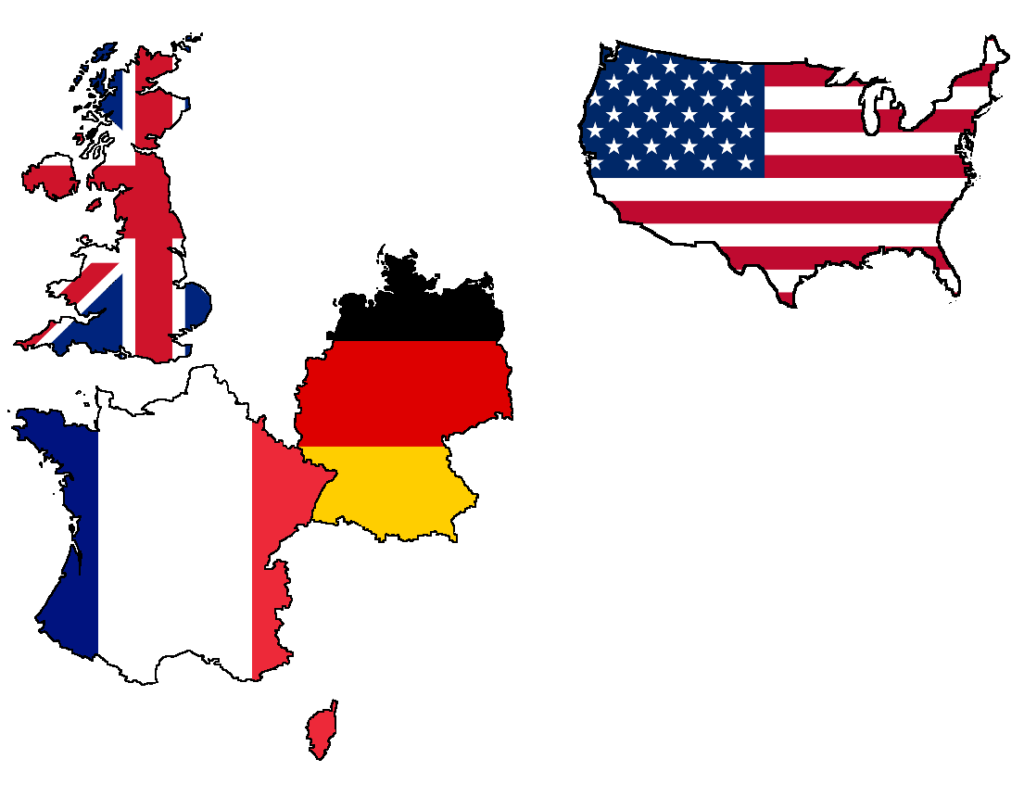
The “big three” European countries may be competing for attention with a Biden administration
A Biden presidency will be more diplomatic and engaging with Europe…so goes the thinking of many Joe Biden supporters. The thinking appears to have some believers in Europe, considering some quick congratulations from European Union (EU) officials to Joe Biden on his election to the U.S. presidency. Biden has said he wants to “elevate diplomacy as the United States’ principal tool of foreign policy.” He may want to get the U.S. “back at the head of the table” but that may not be easy or even the right path. There is a strong argument that “America First” forced some European countries to assume more responsibility—both politically and financially—on the international stage.
The U.S. will have to engage European countries on where their relations are on January 20, 2021 (inauguration day) versus where U.S. relations were with each country back in 2016. And, as expected, relations with some countries are warmer than with others after the past four years. With that in mind, Biden will have to assess U.S. relations with the three biggest European economies (UK, France, and Germany) and push those relationships forward as a signal to other European countries on what a Biden administration represents to (and expects from) the larger European region.
United Kingdom (UK)
Brexiteer meet pro-EU Irish-American…
It was no secret that President Donald Trump and Prime Minister Boris Johnson had a good relationship. The Brexiteer prime minister saw a relatable counterparty in Trump and potential for a trade deal, which is a key piece to the post-Brexit economic life, particularly as it relates to UK trade policy and foreign relations. That trade deal has not materialized during the Trump years as Brexit negotiations remain ongoing. Thus, Johnson must now face the future of his trade deal prospects depending on finding common ground with the pro-European Union, Irish-American president-elect Joe Biden. Consequently, it is no surprise Johnson made a congratulatory call to Biden on his election victory before the debate settles (or settled depending on your view) on the election vote counting.
It should also be no surprise that the Biden administration will have some leverage in the short term. Biden has been very clear that if the UK exits the EU without a deal, which would undercut the Good Friday Agreement (GFA) that brought peace to Northern Ireland, then the U.S. would not negotiate a trade deal with the UK. As a result, the arrival of Biden will likely force some concessions from Johnson—the most obvious concessions being related to the rewrite of the Northern Ireland protocol. Rising unpopularity at home for Johnson will be hard to manage without his biggest international partner, i.e. the US., backing him.
Thus, we should expect Biden to facilitate a UK-EU deal either by actively engaging in the discussions or through indirect commentary on the situation. A UK-EU deal with U.S. support followed by a U.S.-UK trade deal would be the ideal storyline for Biden. That, however, may be too aspirational for Biden’s first or second year considering the nature of EU politics, i.e. things can take long with previous extensions to Brexit talks as an example,…but markets surely can dream of the day in the near future when both a UK-EU deal and a U.S.-EU deal have been signed.
France
Combatting Terrorism and…Capitalism?
The Trump-Macron relationship started with kind words and probably flailed when the U.S. exited the Paris climate deal and walked away from the nuclear non-proliferation agreement with Iran. The disputes and public rancor over NATO contributions, national lockdowns, and socialism did not help the two countries strengthen their ties. A Biden presidency will not automatically change that outlook. The U.S. will quickly return to the Paris climate deal, but it should not expect a major reception or applause as other countries will have to wonder what American participation looks like after the 2024 election if another president wins. Also, it is not clear the U.S. will have the congressional support to significantly spend to support the deal.
Re-entering the nuclear non-proliferation agreement is likely dead on arrival with Congress let alone with Iran. Can the French help bridge the gap between U.S. expectations and Iran’s requested concessions? Probably not. But France could be a partner on NATO relations and an interlocutor on transatlantic relations for the U.S. France will also be a willing partner to confront challenges in Libya, Turkey, and the Sahel in Africa. Though, it is likely the U.S. will be happy to work together on combatting terrorism across those regions but not too much more (or, at least, not in a way that would fully align with French President Emmanuel Macron).
“America First” rightfully will not die tomorrow so Europe will have to assume more responsibility in upholding the strength of NATO and European sovereignty. Macron’s open arms to increased American engagement with the EU in its entirety will likely leave Macron feeling partially unloved. Macron will have to relish in the reality that Biden will be happy to attend EU dinners albeit more for economic reasons, which bids well for some other countries more than it does for France…French economics is not always aligned with American capitalism (so they say).
Germany
U.S.-Germany relations guiding future transatlantic policies…that would be different?
To say President Trump and German Chancellor Angela Merkel clashed may be an understatement. Trump criticized Merkel’s administration for failing to pay their share in defense spending and support to NATO thus the decision to pull troops from American bases in Germany. Trump also criticized Merkel for German participation in the Nord Stream 2 pipeline project—a new export gas pipeline running from Russia to Europe across the sea. Similar to the France-U.S. relations, do not expect a complete U-turn from a Biden administration. Again, the current U.S. engagement will require more money from the pockets of other countries…it hard to think that the U.S. Congress or public would disagree with that view today. Though the request for more European spending will likely not involve threats of tariffs on German products (that will go a long way for U.S. German relations). Settling the troop debate may be easier with a Biden administration…key phrase is “may be.” The pipeline, or more so Russia, will remain a contentious issue. But it does help the U.S. that Germany is also very frustrated with Russia for the alleged assassination attempt by poisoning on Russian opposition leader Alexey Navalny.
Biden and Merkel may find a vast amount of common ground on economic thinking. Biden’s Build Back Better economic plan is capitalistic with a notion of improved social programs and safety nets. Biden will find more alignment with Germany than France on the economy with green jobs and green technology investment…Germany has been pushing for such green industrialization in Europe with great fervor. To be clear, America will not become Germany, but Biden should surely watch the German style of capitalism as he thinks through the implementation of his economic recovery plan. Germans, on other hand, should remember that the economic alignment will not be perfect because of the nature of American politics, i.e. the diverging views on the economics of socialism or the socialism of economics (we are all confused at some level on the language) coupled with congressional input and oversight. Nevertheless, there is great opportunity for Germany to be the American interlocutor for transatlantic economic cooperation. Maybe let France handle the politics of security and terrorism…that could be the ideal structure for Germany.
